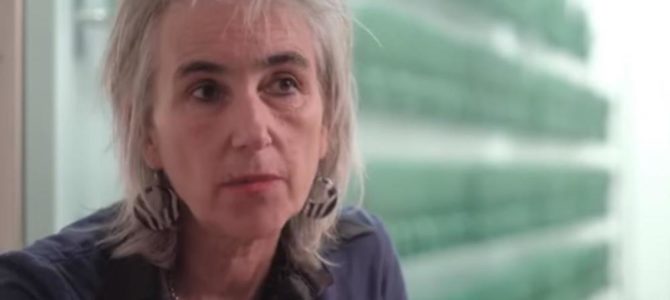In a recently uncovered February 2020 TV interview with World Health Organization (WHO) investigator Marion Koopmans, Koopmans states labs in China were manipulating coronaviruses before the pandemic started. Koopmans, along with others on the WHO team who investigated the origins of COVID-19 in January and February, now denies the coronavirus pandemic was caused by a lab leak. Yet she has admitted Chinese labs were performing the types of dangerous animal experiments that top scientists and U.S. intelligence officials say may have caused the pandemic.
“We are now looking whether we can change those viruses,” Koopmans says in a February 2020 interview uncovered by White Coat Waste (WCW), a nonpartisan watchdog group. “Can we add this virus to it, or can we adjust those viruses to include this one. This is actively happening in a few places worldwide, also in China.” Of course, an animal lab in China manipulating natural coronaviruses is the crux of the lab leak theory.
However, about COVID-19, Koopmans said she and the other investigators “concluded that it’s extremely unlikely there was a lab incident.” Her statements come before the WHO’s official findings report is set to be released this Tuesday.
Koopmans’s public stance is contrary to the suspicions of American intelligence, which has evidence that researchers at the Wuhan lab became infected with COVID-like symptoms before the first known cases in December 2019.
“Despite the [Wuhan Institute of Virology] presenting itself as a civilian institution, the United States has determined that the WIV has collaborated on publications and secret projects with China’s military,” the State Department reported in January. “The WIV has engaged in classified research, including laboratory animal experiments, on behalf of the Chinese military since at least 2017.”
The Biden White House has said it could not rule out the possibility that COVID-19 leaked from the Wuhan animal lab, due to the Chinese government’s lack of transparency.
Koopmans’s own dangerous animal lab experiments and the substantial funding she has received from China for her research suggest she has a stake in denying the lab leak theory. Koopmans was directly involved in animal experiments funded by tens of millions of U.S. taxpayer dollars and the Chinese government at Erasmus University Medical Center in the Netherlands. Koopmans’s experiments involve supercharging swine flu to make it deadlier and more contagious, infecting ferrets, mice, and guinea pigs with the new virus strains.

A photo provided by WCW of ferrets infected with manipulated flu viruses in Koopmans’s lab at Erasmus University.
In a Washington Post column, David Feith, the former U.S. deputy assistant secretary of state for East Asian and Pacific Affairs, explains why Koopmans has a vested interest in dismissing the lab leak hypothesis.
“Koopmans, by the way, has been associated with and now oversees a Dutch lab that in 2011 caused an international uproar over risky ‘gain of function‘ virology experiments that made a deadly influenza virus more transmissible among ferrets and possibly therefore among humans. (Ferrets and humans have similar respiratory biology),” he writes. “This led scientists and governments worldwide, including the Obama administration, to favor limits on lab experiments involving potential pandemic pathogens, as they are called.”
“This is precisely the sort of risky work that the Wuhan Institute of Virology specialized in — carried out in the very labs where researchers fell sick in fall 2019,” Feith continued. “If the Wuhan institute were found to be the source of covid, it could threaten the credibility and funding of virology labs such as Koopmans’s.”
The WSJ editorial board writes, “If an investigation finds it likely that the Covid-19 pandemic was caused by gain-of-function research, that would have repercussions for labs around the world, including at Erasmus MC.” Again, Erasmus MC is Koopmans’s animal lab.
It appears Koopmans’s funding, including the millions of U.S. taxpayer dollars the NIH has been providing her, could be at risk if it’s found that animal experiments like the ones she’s staked her career on led to the COVID-19 pandemic.
https://twitter.com/nataliegwinters/status/1361415616964386818?s=20
Koopmans isn’t the only potentially compromised WHO investigator. Peter Daszak, the only U.S. member of the WHO delegation, worked closely for years prior to the pandemic with the Wuhan Institute of Virology, the organization suspected to have caused the COVID-19 lab leak. Daszak’s nonprofit group, EcoHealth Alliance, funneled the WIV $600,000 in U.S. taxpayer funds between 2014 and 2019 to study bat-based coronaviruses.
Unsurprisingly, before the trip even began, Daszak told the White House it was highly unlikely the virus could have leaked from the Wuhan lab — the lab he has a vested financial interest in protecting.
Daszak told “60 Minutes” on Sunday the WHO team had no choice but to take the Wuhan Institute of Virology scientists at their word, who unsurprisingly said their lab had no connection to the initial outbreak. Daszak also said it wasn’t the WHO’s job to determine whether the Chinese government covered up details about the pandemic’s origins.
The Chinese government demanded total control over all research into the pandemic’s origins, forcing the WHO to give China veto power over the members of its panel of investigators, which might explain why Daszak and Koopmans have everything to lose if the lab leak theory gains traction. The Chinese Ministry of Foreign Affairs also announced on March 19 that Chinese experts had received the English version of the WHO report two days prior and said its release “depends on discussions between Chinese & international experts.”
Justin Goodman, vice president of advocacy and public policy at the White Coat Waste Project, wrote in a statement, “Corrupted lab leak deniers with close ties to the CCP who’ve built their careers on supercharging viruses to make them deadlier and more infectious can’t be trusted to investigate the origins of the COVID-19 pandemic, which a growing chorus of top scientists, public health experts and intelligence officials believe may have started at the Wuhan Animal Lab.”









